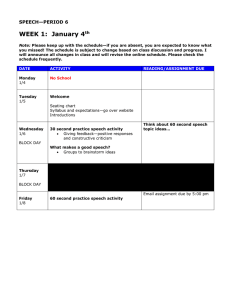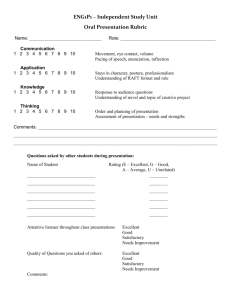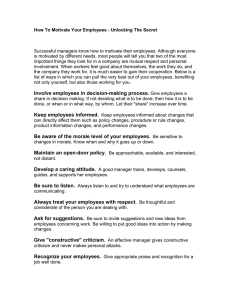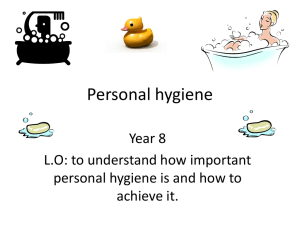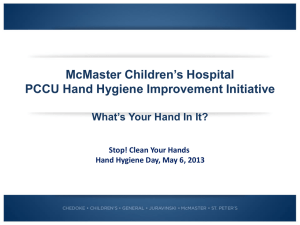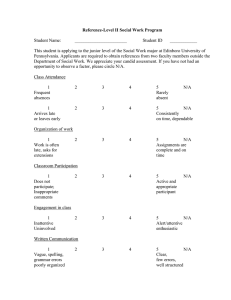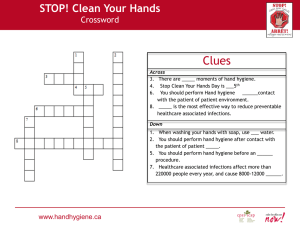self - evaluation tool.doc
advertisement
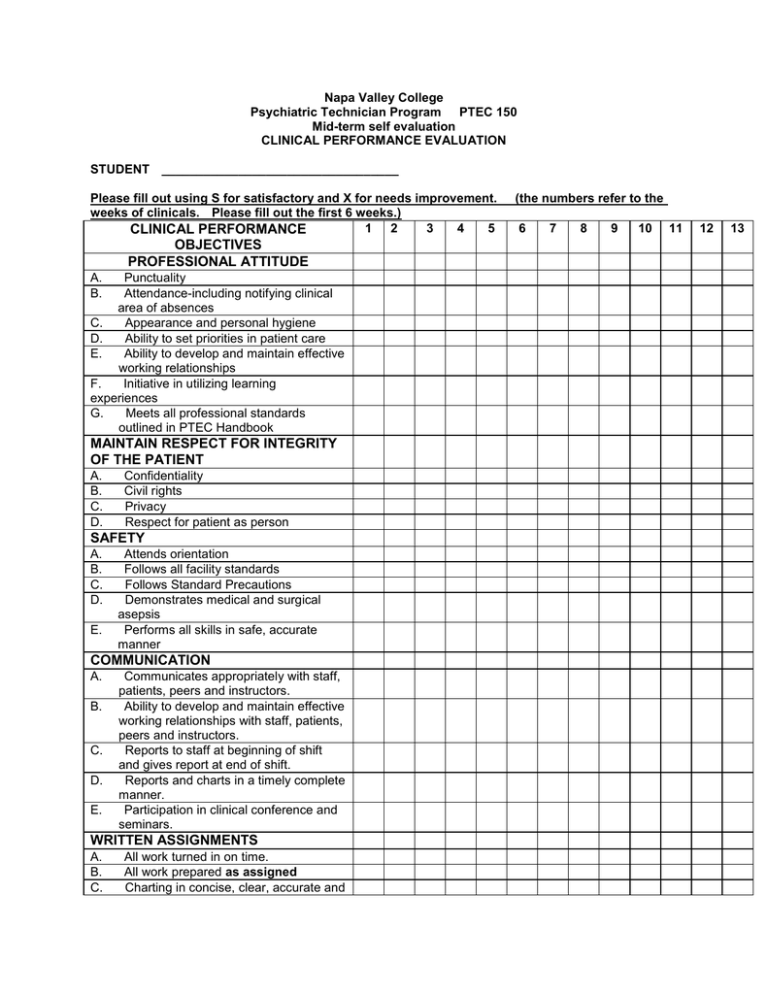
Napa Valley College Psychiatric Technician Program PTEC 150 Mid-term self evaluation CLINICAL PERFORMANCE EVALUATION STUDENT __________________________________ Please fill out using S for satisfactory and X for needs improvement. weeks of clinicals. Please fill out the first 6 weeks.) 1 2 3 4 5 CLINICAL PERFORMANCE OBJECTIVES PROFESSIONAL ATTITUDE A. B. Punctuality Attendance-including notifying clinical area of absences C. Appearance and personal hygiene D. Ability to set priorities in patient care E. Ability to develop and maintain effective working relationships F. Initiative in utilizing learning experiences G. Meets all professional standards outlined in PTEC Handbook MAINTAIN RESPECT FOR INTEGRITY OF THE PATIENT A. B. C. D. Confidentiality Civil rights Privacy Respect for patient as person SAFETY A. B. C. D. E. Attends orientation Follows all facility standards Follows Standard Precautions Demonstrates medical and surgical asepsis Performs all skills in safe, accurate manner COMMUNICATION A. B. C. D. E. Communicates appropriately with staff, patients, peers and instructors. Ability to develop and maintain effective working relationships with staff, patients, peers and instructors. Reports to staff at beginning of shift and gives report at end of shift. Reports and charts in a timely complete manner. Participation in clinical conference and seminars. WRITTEN ASSIGNMENTS A. B. C. All work turned in on time. All work prepared as assigned Charting in concise, clear, accurate and (the numbers refer to the 6 7 8 9 10 11 12 13 D. E. complete. Follows charting format of facility. All work completed by end of rotation. PHARMACOLOGY SKILLS A. B. C. D. E. Maintain 75% accuracy on exams 90% accuracy on generic name, classification, action, dosage and side effects of drugs administered. Demonstrate knowledge of the rules of medication administration. 100% accuracy in pouring, administering, and charting. 80% of the available medication experience DEVELOPMENT OF THERAPEUTIC NURSING SKILLS A. B. C. D. E. F. G. Accurate assessment of self and impact of self on others. Receptivity to feed-back. Accurate assessment of patient. Use of problem-solving to implement plan of care. Ability to develop and maintain professional therapeutic relationships. Systematic observation of deviant behaviors Demonstrates appropriate therapeutic interventions. KEY: S = Satisfactory X = Less than satisfactory = Not available My strengths: My weaknesses: My goals for the next few weeks: Please determine your level of professional behavior. Read Professional Behaviors Rubric carefully Dangerous to Practice: Unable to interact with staff students patients. Disrespectful. Appearance and hygiene are unkempt, unprofessional. Does not participate. Does not accept constructive criticism. Aggressive or abusive to others. ( If one or more of these are present at any time during clinical rotation the instructor may remove the student the program or put on probation) Needs Improvement: Nervous, scattered thoughts. Difficulty completing tasks. Respectful appearance and hygiene are appropriate. Attentive, participated with encouragement. Receives and accepts constructive criticism professionally. ( Student may be put on probation). Acceptable for Experience: Interacts clearly and professionally, may be less than calm. Self-motivated,. Respectful, appearance/hygiene are appropriate. Actively participates, attentive, receives and accepts constructive criticism professionally. Proficient/Field Ready: Interacts calmly, clearly and professionally. Self-motivated, delegates within team, respectful, appropriate appearance and personal hygiene. Actively participates, engaged and attentive. Receives & accepts constructive criticism in a professional manner. Please determine which of the Student learning outcomes you are satisfactorily achieving. Student Learning Outcome S = satisfactory X = needs improvemet 1. Accurately perform and document basic nursing skills, including medication pass without error, basic physical assessments and interventions while prioritizing patient care. 2. Student will ethically advocate for patients with developmental disabilities and children, in all settings, assuring patient’s rights, privacy, dignity and confidentiality. 3. Student will develop leadership and supervision skills and identify need for crisis intervention using the least restrictive measures. 4. Able to effectively participate in a therapeutic environment and communicate in a professional and respectful manner.

